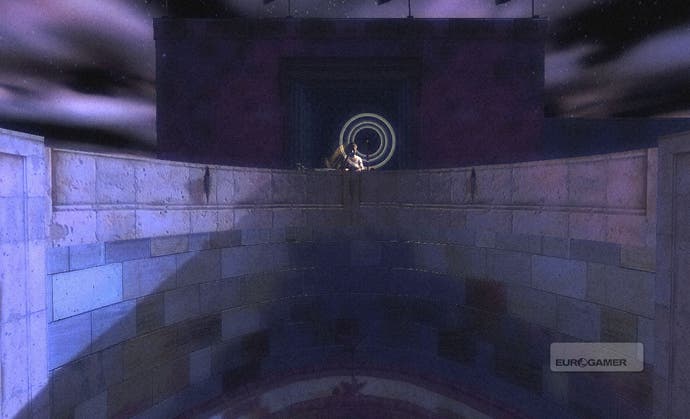Fatale: Exploring Salome
Hide the Salome.
The timeline's been trendily dislocated, too: we start with the fruits of Salome's violent bidding, and then retreat to the placid night above, a chance to muse on her motivations, perhaps, or just wonder why there's an amp and acoustic guitar laid against the wall of Herod's palace, before zipping back to her fateful dance that will set the whole thing in motion.
It's possible that the game's brilliantly infuriating air of lingering vagueness is crucial to the point Tale of Tales is trying to make, and what the developer's getting at, with all the shifting perspectives and fluctuating mechanics, is just how open to interpretation the story of Salome is, from its muddled origins in the pages of the bible through Titian's serene - possibly calculating - minx, to Wilde's curdled temptress. In the face of such a range of different agendas, why not offer a dreamy, ambiguous Salome for an era in which neat explanations are always suspect, and narrative has given way to a dismantled muddle of events that make you question whether history is a product of accident or design?
That's possible, certainly, just as it's possible that I may have had way too much Night Nurse before writing any of this. What seems a little clearer, however, is the sense that, after the sprightly horrors of The Path, Tale of Tales has struggled slightly with this one, perhaps weighed down with a reverence for the source material.
Wilde seems a constant intrusion, popping up in the glowing chunks of script and whispered dialogue that appear whenever Fatale could be establishing its own mood. Wayward and distinctive as the final product is, the developer doesn't seem as able to screw around so deviously with the subject matter this time: the darkly playful tone it brought to the creaking details of Little Red Riding Hood is replaced with something more sober, and more distant.

Tom Wolfe once argued that a grotesque transformation is taking part in the world of art, in that critical theories are becoming more important to a specialised audience than the work itself. He joked that, in the future, galleries will be filled with the rambling, self-indulgent spewing of academia covering the walls, with the painting and sculptures turning up only in the form of little photographs to illustrate the text.
Was he right? In terms of Fatale, it's certainly true that thinking over what you made of the whole experience is often as entertaining and dynamic as the tentative half hour it takes to poke your way through it. Writing about The Path, Kieron pointed out that it clearly wasn't much of a game, and the same is true here, with a slightly shapeless - or at least unwieldy - structure, spread over three wonky acts, topped with awkward controls and an air of cerebral self-involvement that many will find infuriating.
And yet despite all that, you may find that you can't quite forget Fatale, that you come back to its problems, its frustrations, and its ambiguities even when the memories of more fully-realised games have faded. Trapped somewhere between survival horrors and full-blown gallery installations, Tale of Tales remains a fascinating studio. Intimidating and ponderous, its games often feel stunted and incomplete, certainly, but they still manage to trail long shadows behind them.








